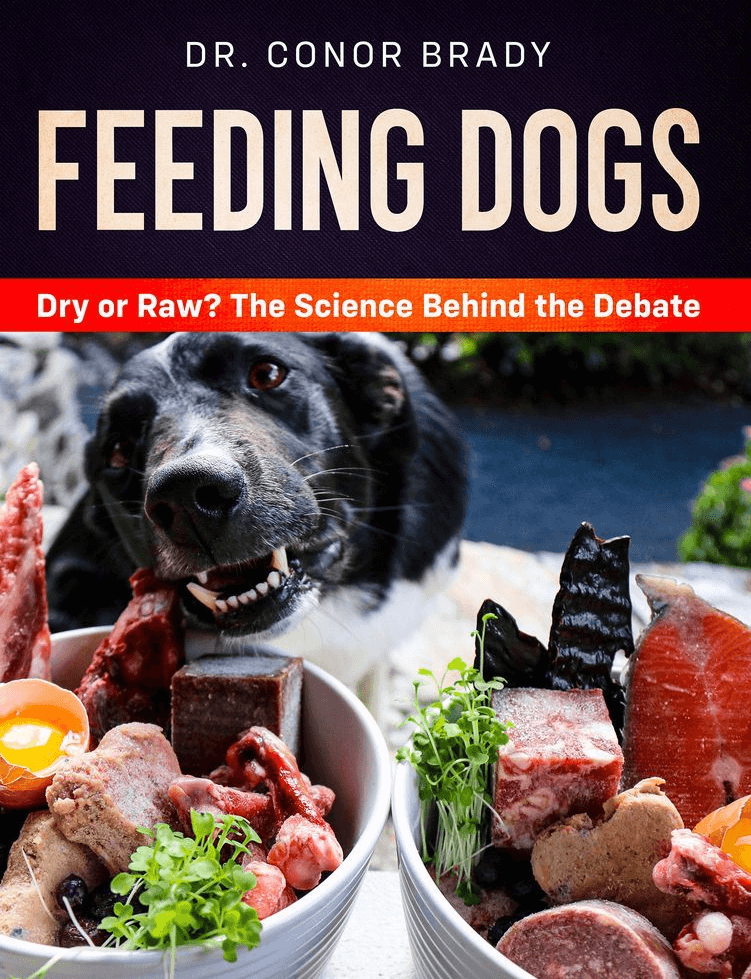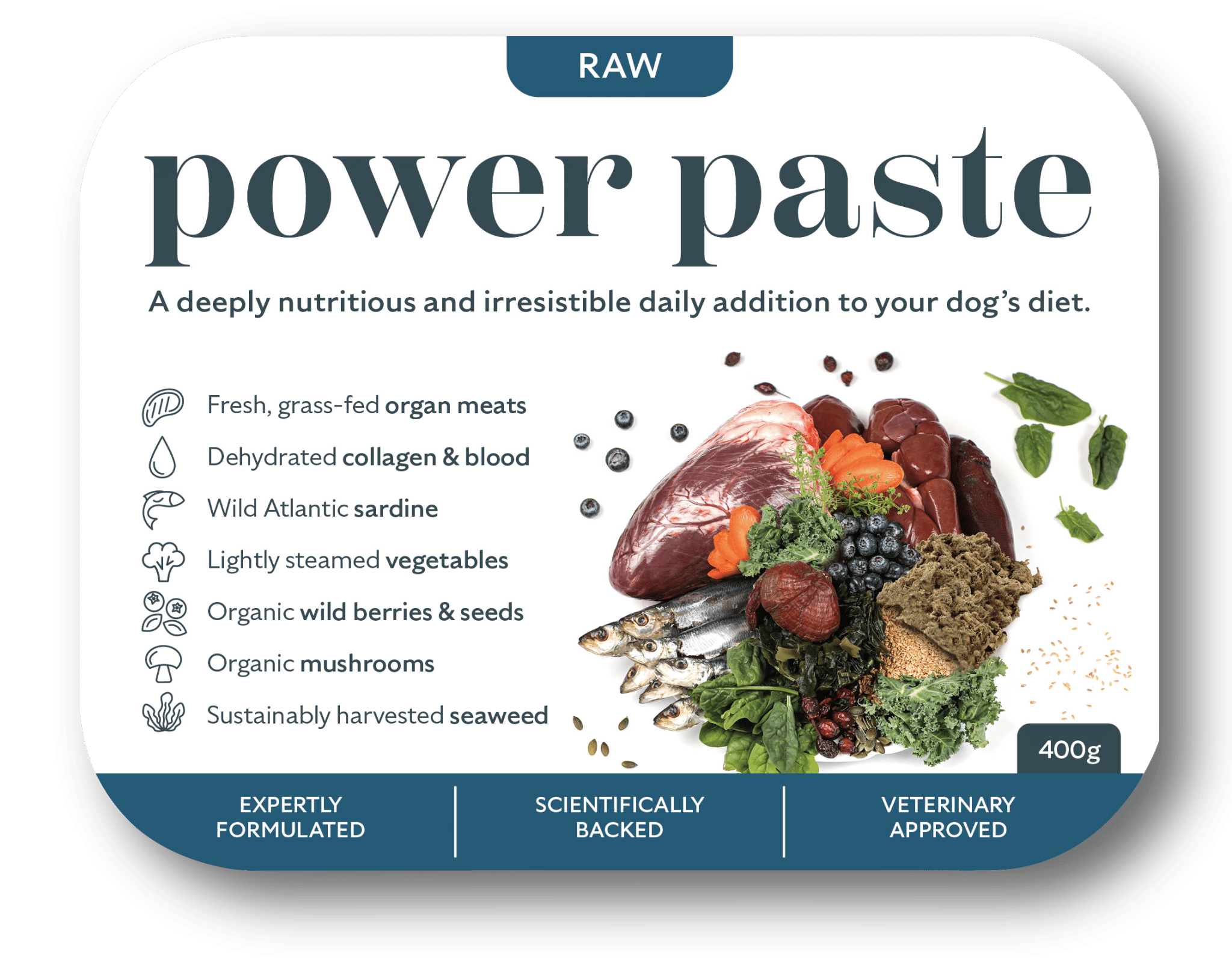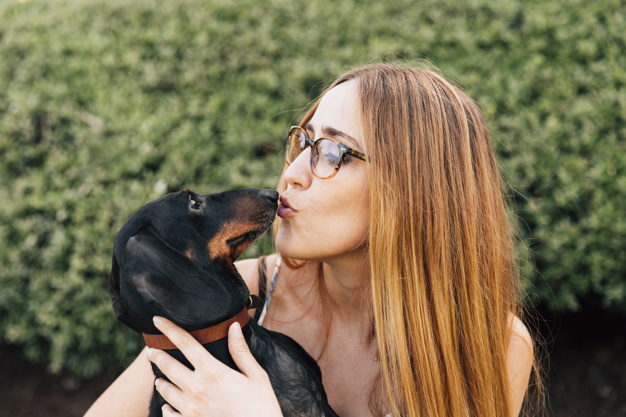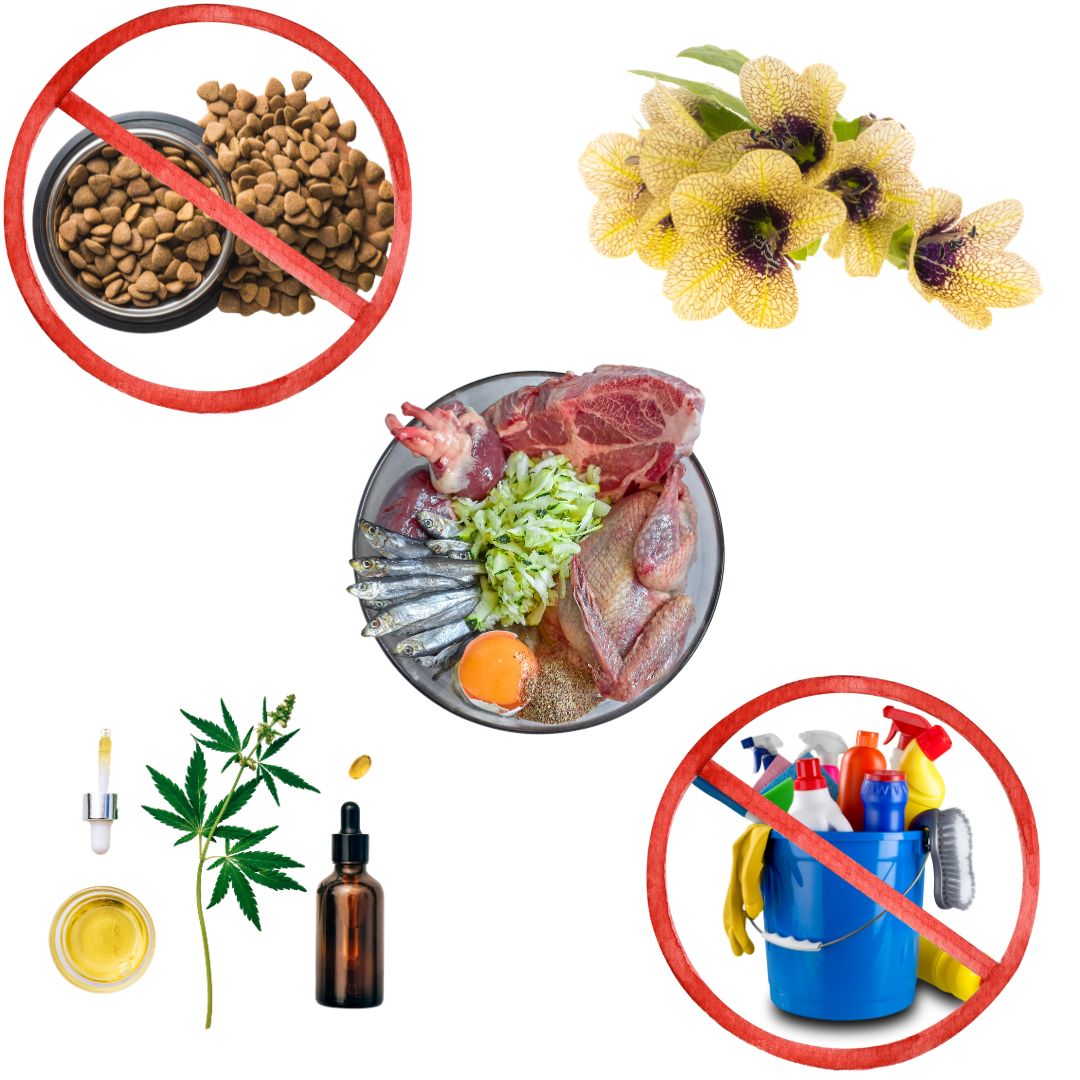In this article, we will cover the following:
This article is the 2nd part of my 5 part series about Allergies in Dogs. Here is the list for you to bookmark:
- Allergies in Dogs [Part 1]: Symptoms, Causes, and Why you need to go with your gut
- Part 2: This one
- What Are Dogs Allergic To? [Part 3]
- Hypoallergenic Dog Diet: How To Do It at Home Better Than Any Kibble
- Elimination Diet For Dog Allergies [Part 5]
If you are the owner of an itchy dog or one with a recurring gut or skin condition, it is likely that at some point, you would have heard the words “allergies”. However, it is not always the case that your dog has an allergy; this may be an intolerance. Even though both can be as destructive, it is important to distinguish the two, and this is what we will be exploring in this article.
What is a food allergy in dogs?
True food allergies are caused by the immune system responding to a particular ingredient or food, believing it is attacking the body. IgE antibodies cause an allergic reaction. These are located on the skin, lungs and mucous membranes.
IgE antibodies will bind to mast cells which release histamine. The immune system goes into full attack mode and will do anything to rid the body of this invader. Allergy symptoms can happen immediately; we have all seen or heard of people suffering from peanut allergies, and the reaction is immediate and violent.
Symptoms of food allergy in dogs
Some of the symptoms of food allergies in dogs can be:
- Itching
- Vomiting
- Diarrhoea
- Hives
- Watery eyes
- Coughing/wheezing
- Sneezing
- Anaphylactic shock

What is food intolerance in dogs?
When a dog is exposed to food that their body has eaten before but feels that it still poses a threat, this triggers the antibody IgG. IgG is not so much the SAS, more like the soldier drafted in to keep back the threat.
IgG antibodies reside mainly within the mucosal lining of the gut; they are there to fight off any invaders. If your dog has chronic gut issues, such as a leaky gut, the mucosal lining will be more permeable, and undigested proteins may leak out of the gut and cause the IgG response to be even higher.
Intolerance symptoms can take longer to show up, sometimes not until 48 hours after an offending food has been eaten; this makes it very difficult to know which food has caused the reaction.
Symptoms of food intolerances in dogs
- Recurring gut, skin ear issues
- Itching
- Vomiting
- Diarrhoea
- Flatulence
- Loss of appetite
- SIBO (Small Intestinal Bacterial Overgrowth)
- Acid reflux
Differences between a food allergy and a food intolerance
Although a reaction in the immune system triggers a food allergy and food intolerance, how they react and which antibody they require is very different.
Also, a true food allergy tends to affect the dog for their whole life, whereas a food intolerance, although it can take a while to overcome, is fixable. Both allergies and intolerances have in common that the ingredients associated with causing them can be the same, as are the often destructive effects.
| Category | Food Allergy | Food Intolerance |
| Trigger | Immune system reaction | Metabolic reaction |
| Antibody | IgE antibodies | IgG antibodies |
| Duration | Affects the dog for life | Can be overcome over time |
| Symptoms | Can cause severe, acute reactions | Symptoms may be milder |
| Onset of symptoms | Sudden onset of symptoms | Symptoms may take longer to appear |
| Treatment | Avoidance of allergen | Gut healing and elimination diet |
| Common causes | Beef, chicken, dairy, wheat, and soy | Beef, chicken, wheat, dairy |
Ingredients commonly associated with food allergies and intolerances in dogs
Your dog’s allergy or intolerance will commonly be caused, surprisingly, by a specific protein. This can be baffling, as dogs are designed to be protein-eating machines.
But oftentimes, this is because there are some gut issues such as the leaky gut, so over time, those cheap, factory-farmed, antibiotic, growth hormone-riddled animals used for the meat in pet food will leak out of the gut and into the bloodstream; triggering that attack within the immune system, so when your dog sees for example, beef, even in fresh form, it will still react—more on this in Part 3: What dogs are allergic to.
Other ingredients likely to cause food allergies or intolerances in dogs are
- Wheat
- Beef
- Chicken
- Dairy (cows milk)
- Food chemicals and additives in ultra-processed foods
- Overuse of chemical flea/worm/tick prevention
- Over vaccination
- Flea allergy Dermatitis (FAD)
But my Vet Diagnosed Dog Allergies To Dust Mites /Pollen/ Flea Bites
Think of food intolerance as an iceberg. What you see on the surface are the symptoms of a much bigger (but hidden) issue occurring under the surface.
Suppose you are intolerant to milk, for example, and you constantly consume it. In that case, your immune system will be under considerable daily strain, and a constantly harassed immune system weakens and tires.
Once exhausted it can go one of two ways, hyper-responsive (where it screams, “if one more thing bothers me, I am going to FREAK out”) or hypo-responsive (it lays down and disease is free to set in). Whichever occurs, it’s bad news for you.
The former, hyper-responsive reaction, explains the “flea-bite” or “dust-mite” allergies in dogs. These critters are everywhere, all the time, certainly on your dog, on and off.
If they had a true allergy, they would be genetically predisposed to the problem, meaning they would have suffered the critters when they were puppies (pups are very prone to fleas as they have weaker immune systems).
That’s how allergies work.
Moreover, dogs have evolved alongside these baddies; do you seriously think they will develop a sensitivity to them at the current rate? No, they’re not.
What your vet is diagnosing is just one of the symptoms of a much deeper issue. Ironically they will likely dose your dog with a harsh chemical, further depleting your dog’s immune resources.
If your dog has flea or mite issues, I would not be concerned with them per se, in that they are not the real problem. I would be more inclined to ask what is wrong with this dog under the hood that they can’t keep a few fleas or mites at bay.

Recommended food or diet for dogs with food allergies or intolerance
This is not as simple as listing foods, as working with your dog’s intolerances requires some TLC and healing from the inside. In part four (natural remedies) of this series on dog food allergies, we go into much greater detail on the best foods.
We can confirm that expensive, high-carb, ultra-processed foods will not help at all. And neither will those chemical parasite treatments or boosters.
Also, think about chemicals you are using in your home; scented candles, plug-ins and household cleaning products; they are a huge contributor to your dog’s itchy, sore skin. Think about non-chemical cleaners such as Ingenious Probiotics
What to do if your dog has food allergies or sensitivity
As this is a very complex subject that involves much more understanding than simply switching foods, we have created an informative and helpful online course; this will explain in great detail why your dog is suffering from intolerances and, most importantly, how you can help your dog overcome these, in the most natural way possible. We also offer health and nutrition consults via zoom should you need more one-to-one help and advice.
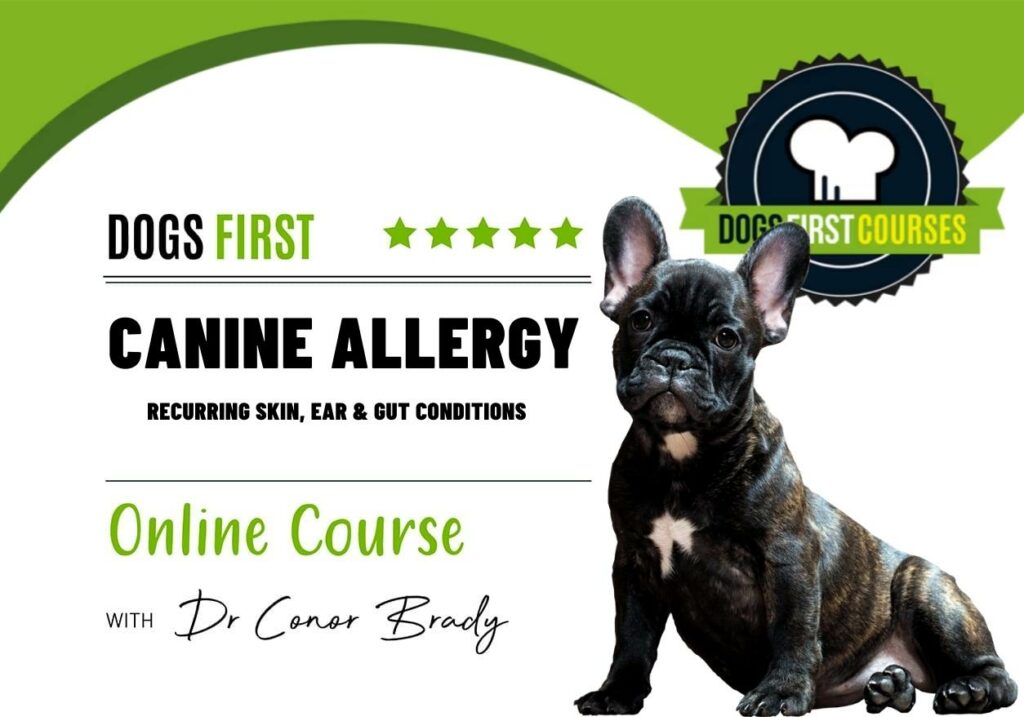
FAQs
1. How Long After Eating Do Dogs’ Food Allergies Show Up?
A true IgE allergy will happen almost immediately when the offending food is consumed. The immune system goes into extreme attack mode and wants to eliminate the threat. True allergies (like a peanut allergy) can be immediate and violent. Thankfully, these true allergies are rare.
2. How Long Will It Take My Dogs Allergy/Intolerance To Be Resolved
If your dog has an allergy in the true sense, IgE triggered, this is not easily resolved; sometimes, these allergies are for life. As stated above, these are rare.
Food intolerance can certainly be resolved, but there is no quick fix; it requires a lot of healing within the gut, getting the microbiome back into harmony and working to discover which foods are an issue.
But rest assured, your dog’s food intolerance can be resolved with patience and support from a professional in the canine nutrition field who promotes fresh food and natural treatments.
3. How Can Adverse Food Reactions In Dogs Be Avoided?
If your dog has a true allergy, the offending food will always cause a reaction. This is a genetic mishap, so the food they are allergic to needs to be avoided; thankfully, as we mentioned above, a true IgE allergy is rare.
To avoid intolerance to foods in your dog, the best thing that you can do as soon as you bring your dog home is to ensure that they eat a species-appropriate, fresh meat, bone, organ and raw bone diet, get them off the ultra-processed foods and avoid all those nasty chemicals – intolerances can show up at any time.
Hence, it’s not always possible to avoid them, but part one can help you understand what might be causing the intolerance and how the gut may be the root cause and the way to fix things.



